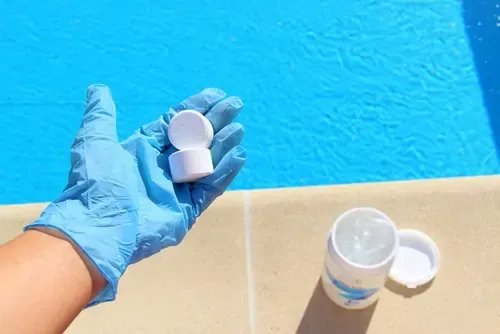It is important to make sure that the chemicals in your heart are balanced so that your equipment, including your robot pool cleaner, can work properly. Calcium hardness, or the amount of calcium in your pool water, is one of the most important factors in pool water chemistry. Testing calcium hardness is important for preventing corrosion and etching on pool surfaces and equipment. But how can you elevate calcium levels when they are too low? In this article, we’ll discuss if baking soda can help raise calcium hardness in your pool and how to effectively manage your pool’s water chemistry.
What is Calcium Hardness, and Why is it Important?
Let’s start by explaining calcium hardness, as well as why it’s necessary in your pool, before we get specific about baking soda. Calcium hardness measures the amount of calcium present in your pool water, usually expressed in parts per million (ppm). Calcium hardness in pools should be around 200 to 400 ppm. And when levels are low, it leads to problems like:
Your pool vacuum robot and other robotic cleaners are being corroded by the acidity of the water.
Also, there is etching or damage to pool plaster or tile.
An unstable pool chemistry means it is difficult to keep a balanced pH and alkalinity.
Maintaining proper calcium hardness is crucial to avoid these problems. But what about raising calcium hardness with baking soda?
Does Baking Soda Raise Calcium Hardness?
The short answer is no, baking soda (sodium bicarbonate) does not raise calcium hardness in your pool. Baking soda today is one of the main ingredients they use to raise alkalinity and pH level in the pool water, and they know that it is free of calcium. Instead, it primarily affects your pool water’s alkalinity—although raising alkalinity levels can improve overall water balance.
Calcium Hardness: How to Bring It Up in Your Pool
Now, you may be asking yourself, if baking soda doesn’t work to raise calcium levels, how do you increase calcium hardness in your pool? Below, you will find the most popular ways to do so:
Add Calcium Chloride
Calcium Chloride: The best method for raising calcium hardness in your pool. Calcium chloride is a soluble compound that increases the level of calcium in your swimming pool by dissolving quickly in water.
How to Add Calcium Chloride:
Testing the water: Before adding any chemicals, it is advisable to check the calcium hardness level using a good test kit.
Chloride commerce: Use a pool calculator commerce. Your course is in the right amount of calcium chloride based on the volume of your pool and the current calcium hardness.
Add evenly: Finally, slowly add the calcium chloride to your pool, preferably in the vicinity of the deep end, so that it can dissolve and circulate. You can also use your robot pool cleaner (like the Beatbot AquaSense Pro) to assist with circulating the water and distributing the chemicals more evenly.
Retest: A couple of hours later, retest the water to see if the calcium hardness is where you want it.
Use a Calcium Increaser
Calcium increase products are also sold that are designed to increase the calcium hardness levels in pools. Because they are designed to prevent overdosing and balance the other factors of pool chemistry, these products are often easier to use.
Add Hard Water
If you reside in a hard-water area (water that is high in calcium), and you have access to it, fill the pool with this water. In the long run, this technique can consistently boost calcium hardness levels, just not quickly.
How to Keep Pool Chemistry Balanced With a Robot Pool Cleaner
After you’ve raised your calcium hardness, finding the right chemical balance is crucial to maintaining your pool’s water quality and keeping your robot pool cleaner running at its best. In addition to this, a pool vacuum robot such as the Beatbot AquaSense, can help you clean the pool which also helps in maintaining circulation and balance of the chemicals. This regular cleaning will remove any dirt or debris left in your pool, ensuring the pool chemistry remains balanced.
But, for best results, try using your swimming pool robot cleaner regularly to help you keep your pool clean, and you might also like to consider our models, Beatbot iSkim Ultra and Beatbot AquaSense Pro for efficiency and consistency.
Takeaway: How to Properly Increase Calcium Hardness in Your Pool
Baking soda is a helpful chemical for keeping your pool alkaline, but it won’t add calcium hardness. Calcium chloride or calcium increase products can be used to raise calcium levels. Monitoring the hardness of your pool water and making adjustments where necessary is crucial for the life span of your robot pool cleaner and the cleanliness and stability of your pool. (Once you have hardness in range, your robotic pool cleaner, like the Beatbot AquaSense, will become even more efficient.)
With proper calcium hardness checks and the right pool vacuum robot, you will have a cleaner, safer, and more enjoyable swimming experience with little effort.
